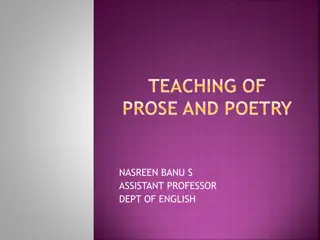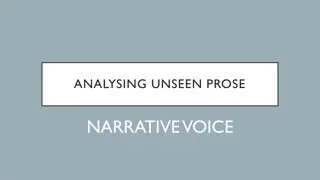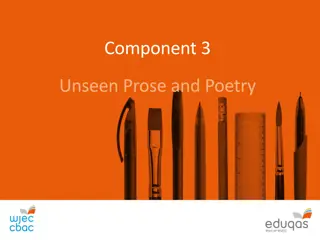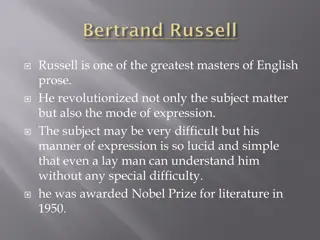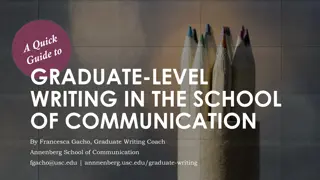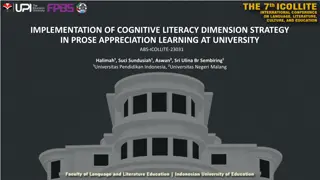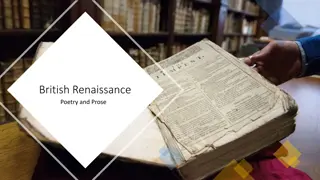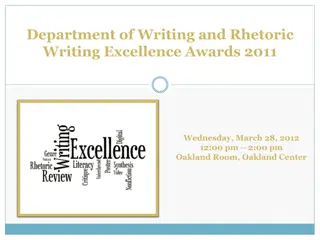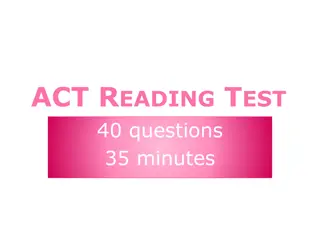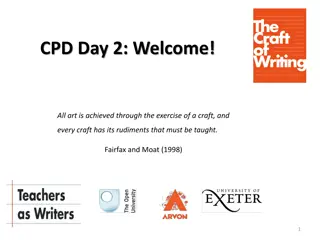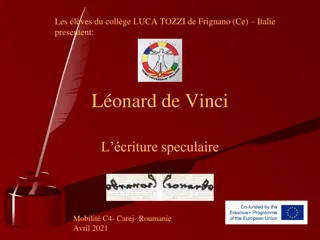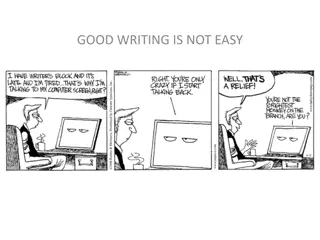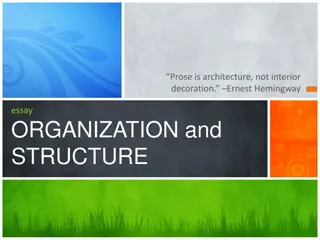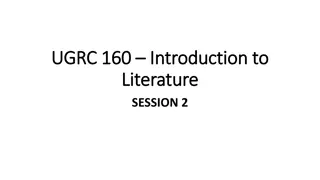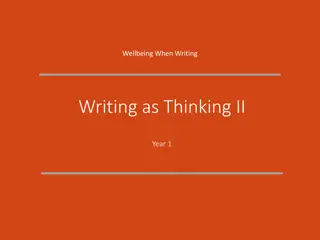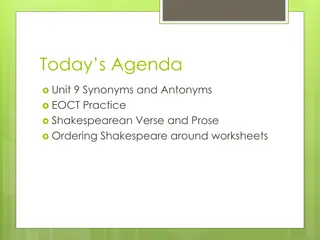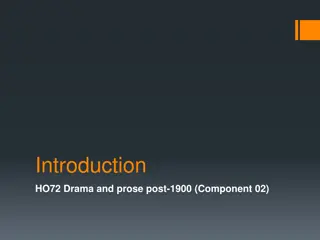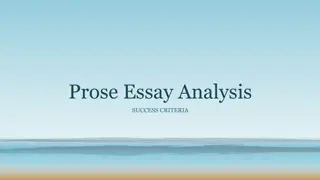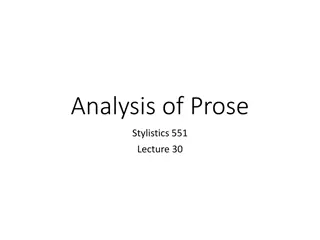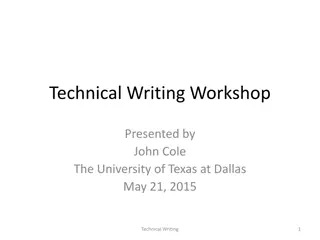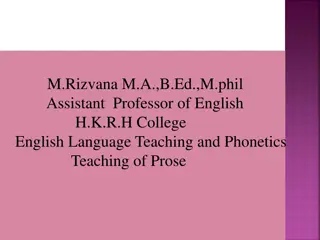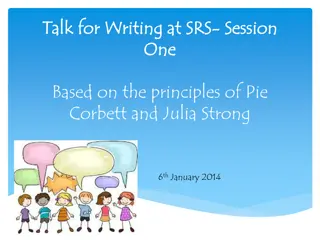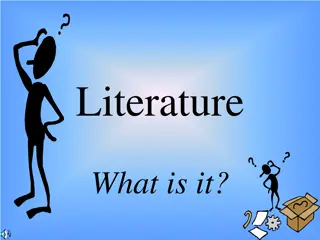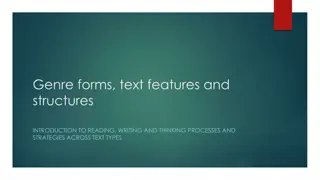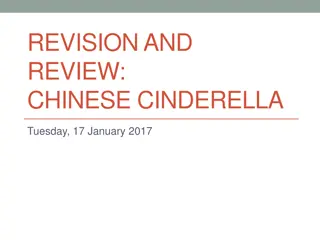Exploring Citizen Journalism and Non-Fiction Writing
Explore the world of citizen journalism and non-fiction writing, learning about text types, adapting writing to conventions, considering audience, purpose, and tone. Discover the significance and usefulness of non-fiction writing, and delve into creating various text types. Uncover the role of citiz
1 views • 11 slides
Comprehensive Overview of English Writing Course
This comprehensive English writing course, led by lecturer Muhammad Muslim Nasution, covers various aspects such as grammar, vocabulary, writing styles, and assessments. Students are required to actively participate, submit assignments, attend classes regularly, and produce writing projects. The cou
2 views • 8 slides
Teaching of Prose and Poetry by Nasreen Banu - A Comprehensive Guide for English Learners
Delve into the intricacies of teaching prose and poetry with insights from Assistant Professor Nasreen Banu. Learn about the aims, general objectives, steps, and alternative methods for engaging students in English language learning. Enhance listening and speaking skills through a structured approac
0 views • 19 slides
Understanding Narrative Perspective in Unseen Prose Narratives
Explore the narrative voice in unseen prose narratives through the analysis of different narrative perspectives, such as homodiegetic and heterodiegetic narrators. Understanding these terms helps in interpreting the impact of perspective on storytelling and themes in literary texts for exam preparat
1 views • 17 slides
Insights into Unseen Prose and Poetry Analyses
Delve into the assessment of unseen prose and poetry with a focus on introductions, candidate evaluations, and critical engagement. Explore the importance of contextual references, vocabulary analysis, and integration of other readings in shaping responses to literary texts.
1 views • 12 slides
Mastering Academic Writing: Strategies for Success
Academic writing is a formal style of writing with specific characteristics such as accuracy, brevity, and clarity. Understanding academic style is crucial for success in your course as it reflects your engagement with the content. Successful academic writers read, learn new vocabulary, and have a s
0 views • 23 slides
Exploring the Mastery of English Prose: The Style of Bertrand Russell
Bertrand Russell, a Nobel Prize-winning writer, revolutionized English prose with his lucid and simple expressions on complex subjects. Known for his use of long sentences, terseness, allusiveness, and irony, Russell's style combines clarity with deep meanings and continuity of thought. His allusion
0 views • 11 slides
Challenges and Perspectives in Academic Writing for English Learners: Insights from Yemeni Students and Educators
Exploring the challenges and experiences of MA English students in academic writing, the narrative reveals issues faced by learners in Yemen such as outdated curricula, lack of teaching aids, and struggles with writing skills. Insights from a teacher highlight improvements in syllabi yet continued c
0 views • 14 slides
Academic Writing Essentials: Background, Types, and Formats
Explore the essential aspects of academic writing in this comprehensive guide. Learn about the purpose of academic writing, common types such as projects and essays, and the formats for short and long writing tasks. Discover the features of academic writing like accuracy, objectivity, and formal sty
4 views • 46 slides
Understanding Graduate-Level Writing in Academic Communication
Explore the nuances of academic writing at the graduate level in the School of Communication with Francesca Gacho, a Graduate Writing Coach. Learn about the features, characteristics, and strategies necessary for various genres of writing in this context. Discover the expectations and conventions of
2 views • 30 slides
GCSE English Literature Exam Overview
This overview provides information on the GCSE English Literature exam structure, content, and assessment objectives for both components. It includes details on the texts studied, such as Shakespeare, poetry, post-1914 prose/drama, and 19th-century prose. Students are assessed on their ability to re
0 views • 23 slides
GCSE English Literature Exam Overview
This GCSE English Literature exam overview provides details on the components, assessment objectives, text choices, and key information for students. It covers Shakespeare, Poetry, Post-1914 Prose/Drama, 19th Century Prose, and Unseen Poetry. Students will engage with a variety of texts ranging from
5 views • 23 slides
Implementation of Cognitive Literacy in Prose Appreciation Learning
The study focuses on the implementation of cognitive literacy dimension strategy in prose appreciation learning at universities. It discusses the impact of technological advances on society and the importance of incorporating moral values in education. The research findings indicate that the cogniti
0 views • 8 slides
Practical Criticism: Analysis and Appreciation of Poetry and Prose
Delve into the world of practical criticism and critical appreciation in BA III English studies with a focus on analyzing and appreciating poetry and prose. Explore the history, significance, and methodology behind this literary practice while gaining insights into interpreting unseen poems. Discove
3 views • 20 slides
British Renaissance Poetry and Prose: Influential Poets and Their Works
Explore the world of British Renaissance poetry and prose through the works of renowned poets like Sir Thomas Wyatt, Edmund Spenser, and Sir Philip Sidney. Dive into the evolution of the sonnet form, from Wyatt's introduction of the Italian/Petrarchan sonnet to Spenser's masterpieces like "The Faeri
1 views • 13 slides
Creative Teaching Approaches for Persuasive Writing Workshop
The workshop focuses on using Grammar for Writing principles to enhance teaching of persuasive writing, emphasizing modal verbs and adverbials. It encourages creative writing by engaging young writers' imaginations and beliefs, allowing freedom to explore ideas. Participants learn key teaching princ
0 views • 51 slides
Understanding Paragraph Organization in Historical Prose Writing
Explore the D-N-A structure of paragraph organization in historical prose writing, focusing on transitional words, revision strategies, and the inseparable connection between history and writing. Learn how to develop effective paragraphs that guide the reader through your historical narrative.
0 views • 18 slides
Department of Writing and Rhetoric Writing Excellence Awards 2011
The Department of Writing and Rhetoric at Oakland University organized the Writing Excellence Awards in 2011, recognizing outstanding submissions across various categories including writing from/about sources, original research, visual and/or auditory composition, fiction, and creative nonfiction. T
1 views • 42 slides
Understanding the ACT Reading Test Content
The ACT Reading Test comprises 40 questions to be answered in 35 minutes, covering four categories: Prose Fiction, Humanities, Social Sciences, and Natural Sciences. Each category has a specific percentage of questions. The test evaluates your ability to comprehend various passages, including prose
1 views • 24 slides
Comprehensive Guide to Kindergarten Writing Training for NYSESLAT 2019
Explore a detailed guide on Kindergarten Writing Training for the NYSESLAT 2019 exam. The training covers four constructed-response types including Letter Writing, Word Writing, Sentence Writing, and Writing a Story. Gain insights into the application of holistic writing rubrics, analyzing student r
0 views • 24 slides
Craft of Writing Framework for Teaching Writing
Explore the Craft of Writing Framework to enhance your teaching of writing skills, transforming your Arvon residential experiences into effective classroom strategies. Embrace language choices, text-level decisions, authorship, writing processes, and reader-writer relationships to empower students i
0 views • 39 slides
Enhancing Postgraduate Academic Writing: Feedback Collaboration Model
Developing a collaborative model for postgraduate academic writing courses involves understanding the role of feedback, focusing on content feedback, and exploring the intersections between discipline specialist and writing tutor feedback to improve academic writing abilities. Feedback offers valuab
1 views • 27 slides
Leonardo da Vinci and His Mirror Writing
The students of Luca Tozzi College in Frignano, Italy, explore Leonardo da Vinci's specular writing, a unique form of left-handed writing that can only be deciphered using a mirror. Discover Leonardo's diverse talents as a painter, inventor, scientist, and writer, with a mysterious side to him as a
0 views • 14 slides
Mastering the Art of Good Writing
Crafting compelling writing requires attention to detail, from intriguing leads to precise word choices and smooth transitions. Explore the essential elements of good writing, including tips for engaging readers and a checklist for evaluating writing quality. Learn about different types of leads in
0 views • 42 slides
Understanding the Organization and Structure of Writing
Explore the fundamental aspects of structuring writing including the importance of introductions, effective opening sentences, and the basic essay structure with a focus on capturing the reader's attention and conveying the main thesis effectively. Discover how to build a cohesive structure that enh
0 views • 22 slides
Understanding Elements of Fiction in Prose Writing
This session delves into the essential elements of fiction in prose writing, covering plot development, characterization, setting, and more. Students will learn to analyze and interpret these elements in stories, with a focus on applying their understanding to a specific short story. Through detaile
0 views • 15 slides
Enhancing Wellbeing Through Writing: Writing as Thinking
Explore the connection between writing and thinking as a vital tool for academic writing. Delve into strategies for effective writing, evaluating its impact on rigorous thinking, and overcoming challenges through reflective writing exercises.
0 views • 34 slides
Enhancing Writing Skills at Escrick C of E Primary School
At Escrick C of E Primary School, the approach to English education focuses on core skills like phonics, reading, writing, and letter formation. The curriculum incorporates a variety of text types and genres, including persuasive writing, biographies, fiction, and poetry. Writing activities are embe
0 views • 10 slides
Understanding Shakespearean Verse and Prose: A Comprehensive Guide
Delve into the intricate world of Shakespeare's language with a focus on prose, rhymed verse, and blank verse. Learn how to distinguish between these forms and their significance in his plays through visual and textual clues. Explore examples of rhymed couplets and heroic couplets, shedding light on
0 views • 24 slides
Writing in Computer Science Research: Enhancing Technical Writing Skills
This course overview covers the main objectives, class structure, and learning outcomes of a Computer Science Research Writing course focused on developing students' writing abilities, providing constructive criticism, and applying technical writing concepts to research papers in a workshop format.
0 views • 46 slides
Study of Modern Drama and Prose Post-1900
This component focuses on the study of a modern play (The History Boys) and a modern prose text (The Great Gatsby). Learners explore cultural and contextual influences on writers and readers, analyze literary texts, demonstrate understanding of contexts, and make connections across texts. The examin
0 views • 23 slides
Spring into Writing: Enhancing Writing Skills for Children
Join us for an evening dedicated to enhancing writing skills for children according to Maryland College and Career-Ready Standards. Learn about writing expectations, get motivated writing ideas for children, and explore fun writing opportunities at home. The event will provide insights into differen
1 views • 19 slides
Prose Essay Analysis Success Criteria
Explore the steps involved in analyzing a prose essay for success criteria. From reading the exemplar essay to developing criteria and reflecting on improvement strategies, this process aims to enhance writing skills and achieve measurable goals in future essays.
0 views • 6 slides
Understanding Stylistic Analysis in Literature
Stylistic analysis in literature involves examining linguistic features like lexis, grammar, foregrounded elements, and context to distinguish between literary and non-literary prose. While poetry allows for whole text analysis due to its brevity, prose analysis often focuses on selected extracts fo
0 views • 16 slides
Comprehensive Technical Writing Workshop by John Cole at The University of Texas at Dallas
Explore the world of technical writing with John Cole, an experienced instructor at The University of Texas at Dallas. This workshop covers the fundamentals of technical writing, including course objectives, programming, course outline, traits of technical writing, and what technical writing truly e
0 views • 58 slides
Effective Strategies for Teaching English Prose - A Comprehensive Guide
Teaching English prose is a fundamental aspect of language education, focusing on reading comprehension, vocabulary enrichment, and writing skills. This guide covers the objectives of teaching prose, including enhancing comprehension, pronunciation, vocabulary, and writing abilities. It emphasizes i
0 views • 21 slides
Enhancing Writing Skills Through Talk for Writing Approach
Discover the key principles of Talk for Writing, understand the importance of Shared Writing, and explore how to improve the teaching and learning of writing in your classroom. Learn about the challenges children face in writing compared to reading and how Talk for Writing can help externalize the i
0 views • 27 slides
Exploring the World of Literature
Literature encompasses various genres such as poetry, drama, and prose, each with unique elements and characteristics. It provides a platform for expressing ideas, emotions, and stories in a creatively compelling manner, capturing the interest of readers for generations. Discover the artistry of poe
0 views • 12 slides
Understanding Genre Forms, Text Features, and Structures in Reading, Writing, and Thinking
Explore the world of genre forms, text features, and structures in this engaging session. Learn to classify different texts, recognize generic features, and understand the main literary genres including prose, poetry, and drama. Delve into the nuances of prose writing, the musical quality of poetry,
0 views • 22 slides
Analysis of Structure and Form in Chinese Cinderella
Explore the internal organization and prose style of the text "Chinese Cinderella" through an examination of structure, narrative form, dialogue usage, and character development. Dive into how the sections are divided, the use of dialogue to define characters, and the indicators that stand out in th
0 views • 6 slides


